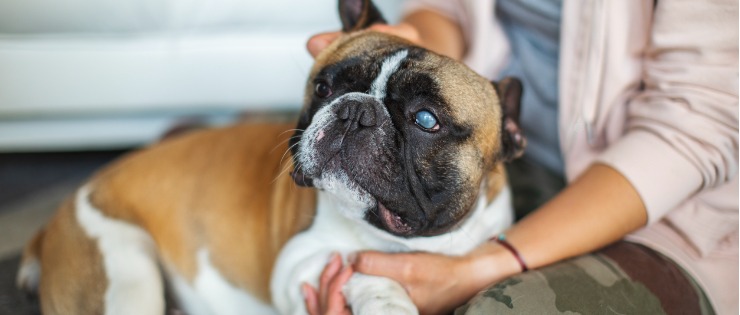
If you’re anything like me, one of the best moments of the day is when you and your pooch see each other for the first time in the morning! The boundless energy and unbridled happiness warms the heart and sets such a lovely tone for the day.
As a vet, I’ve dealt with countless dogs who partially or completely lose their sight. What I can confirm is that even if they can’t see you, dogs still get just as excited by your presence in the morning! They thrive on your love and their capacity for excitement remains intact. It falls on us as dog owners to make a few changes to ensure they live happy and fulfilled lives.
These changes are very doable, which is great news that should help ease the worry and concern if your pooch begins to suffer from a visual impairment. Today we’re going to look at some of these steps you can take. First though, let’s briefly go over what could be causing blindness in your dog.
What Causes Blindness in a Dog?
There are a variety of factors that could be at play here. If you get a feeling that all is not well with your dog's sight, please get them to the vet as soon as possible for an assessment. These are some of the issues that could be the cause, but it's not a definitive list. Your local vet is the go-to for all your questions.
- Glaucoma: This is when fluid in the eyes builds up pressure that damages the optic nerve.
- Cataracts: This is a painless condition when the eye lens becomes cloudy and difficult to see through.
- Infections: Eye infections can lead to temporary or permanent blindness if left untreated.
- Injuries: Was your dog involved in any kind of accident? Trauma to the eyes can result in partial or complete loss of vision.
- Old age: Sight issues can be linked to a doggo slowing down as they get older.
- Progressive Retinal Atrophy (PRA): This inherited condition causes the retina to degrade over time.
How to Ensure a High Quality of Life for Your Blind Dog
You’ve now got an understanding of what could be causing your dogs blindness. When a vet clarifies the problem for you, they will suggest a number of things you can do to help your little buddy lead an enriched life. Here are some of them.
Create Routines and Avoid Change
Dogs love routine, and for blind dogs it's extremely important. Establish a consistent daily schedule for feeding, walks, playtime, and toilet time. Minimise changes in your dog's environment as much as possible, and if you must make changes, introduce them gradually. Try not to rearrange the furniture. This stability will help your blind dog feel secure and confident in their surroundings.
Install Safety Measures in the Home
Safety should be a top priority for a blind dog. It’s almost like having a toddler in the house - you have to dog-proof everything! Remove hazards like sharp objects, low-hanging decorations, or items that could be tripped over. Use baby gates to block off stairs or dangerous areas, and consider adding textured rugs or mats to help your dog navigate slippery floors. Keep doors to unsafe areas closed.
Verbal Cues Training
Hearing becomes a really important sense when a dog loses their sight. Verbal cues are an effective means of communicating with them. Be consistent in the words you use for commands or praise, and they will slowly become trained to associate the cue with its required action. Positive reinforcement is handy here (heeeellloooo doggy treats!)
Tactile Cues in the Home
This is a cool thing to do. Your blind dog will be able to navigate their environment better with the use of tactile cues, which means things they can feel. A textured rug can be used to mark a doorway. Wood chips near your backyard fence can let them know a fence is there before they run into it!
Don't Stop Playing with Your Dog
Blind dogs still enjoy playtime and mental stimulation, so don’t stop engaging in daily fun time with the pooch! Their other senses will make up for their lack of vision, so go for those noisy toys that squeak or rattle.
There’s nothing to say your relationship with your blind dog can’t be a rewarding, loving and compassionate one. You’re gonna need patience and you’re gonna need to make a few changes to your daily routine and your living space. But at the end of the day, it’s worth it for the joy your dog will bring into your life!